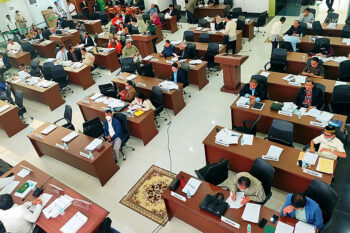DAVAO CITY (MindaNews/23 March) — The city council approved Thursday an ordinance amending a provision of the Revenue Code of Davao City that would reclassify public markets in the locality.
Councilor Jose Louie Villafuerte, author of the measure, said the ordinance would address complaints from market vendors about the implementation of Section 332, Chapter 5, Article 11 of the Revenue Code, or the classification of public markets.
“The previous implementation of such provision resulted in exorbitant rental fees,” he said, adding that market stall owners complained that it was “unaffordable and excessive considering the existing conditions of the public markets and present economic difficulties.”
The ordinance increased the public markets’ “average monthly income” ceiling by at least twice and changed the period during which the income is computed from six months to a year.
The “average monthly income” refers to the total amount collected by the city treasurer from the market vendors for the use of the booth/stall or space they are occupying, and all other income derived from market operations, but excluding the amount of electric and water bills paid by the vendors/occupants.”
City treasurer Rodrigo Riola said in a text message Friday that the ordinance may lead to the reclassification of some public markets into lower classes, resulting into lower rental fees for the vendors.
Before the ordinance’s approval, he said that among the major public markets in the city, Agdao and Bangkerohan markets fall under Class A, Calinan, Toril and Tugbok under Class B, and the rest under Classes C and D.
The ordinance did not tweak the Revenue Code’s rental fee rates, but vendors may pay lower rentals if the market where they operate would have a demoted classification. The prevailing rental rates per square meter—for the meat section for instance—are P20 for the Class A market, P14.25 for Class B, P8.50 for Class C and P6.25 for Class D.
With the Revenue Code’s amendment, the average monthly income ceiling for Class A markets is now pegged at P1 million or more in the preceding 12 months, from an average monthly income of P450,000 or more during the preceding six months.
Class B public markets should have an average monthly income of at least P500,000 but not more than P1 million during the preceding 12 months. Before, Class B markets were those with average monthly income of P300,000 but not more than P450,000 during the preceding six months.
Class C public markets should have an average monthly income of at least P200,000 but not more than P500,000 during the preceding 12 months. Before, Class C markets were those with average monthly income of P150,000 but not more than P300,000 during the preceding six months.
Class D public markets should have an average monthly income of at least P100,000 or more but not more than P200,000 during the preceding 12 months. Before, Class D were those with average monthly income of less than P150,000 during the preceding six months.
Villafuerte said before the amendment, the power to reclassify public markets was vested solely to the city treasurer upon consultation with the city administrator or his duly authorized representative.
“A legislative approval is needed before any market reclassification can be made for transparency and the protection of public interest,” his earlier resolution said.
With the amendment, the city treasurer “shall make an initial determination to reclassify a public market base on the average monthly income. When the city treasurer recommends reclassification, he or she shall submit his or her recommendation to the market committee for consultation and evaluation.”
The ordinance also stated that in evaluating the recommendation of the city treasurer, the market committee “shall also consider other factors in the reclassification of public markets other than the average monthly income such as but not limited to the public market’s existing infrastructure, improvements, service capacity, and other socio-economic factors for an equitable increase in the market rental fees.”
It also said that the market committee will determine whether or not reclassification is needed, and that it will submit a resolution endorsing a reclassification to the city council for its approval by enacting an ordinance. (Lorie Ann A. Cascaro/MindaNews)







